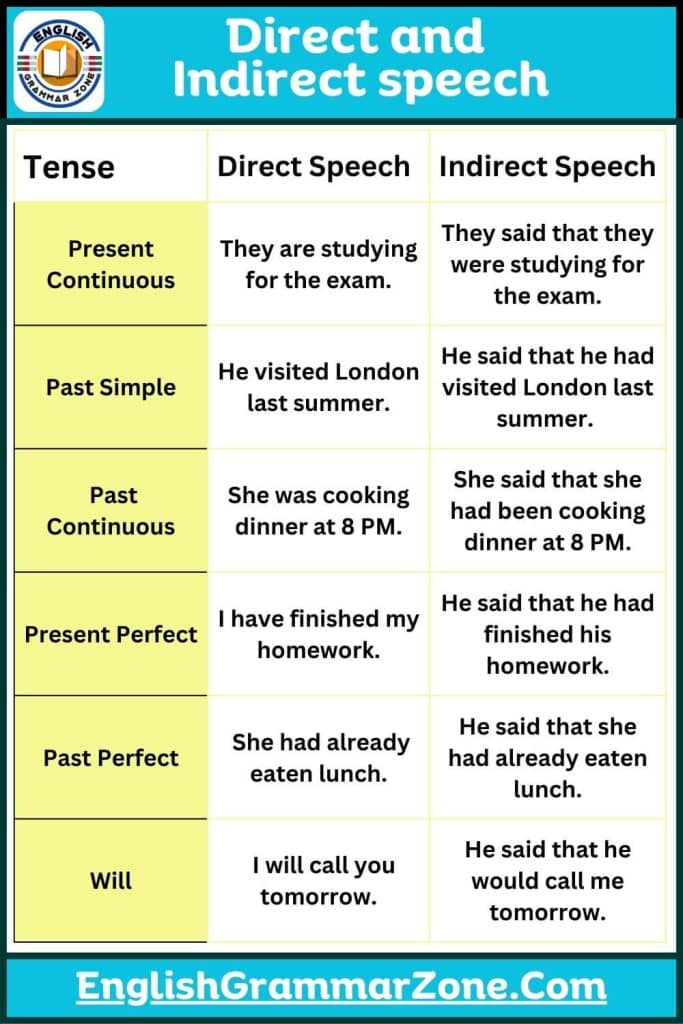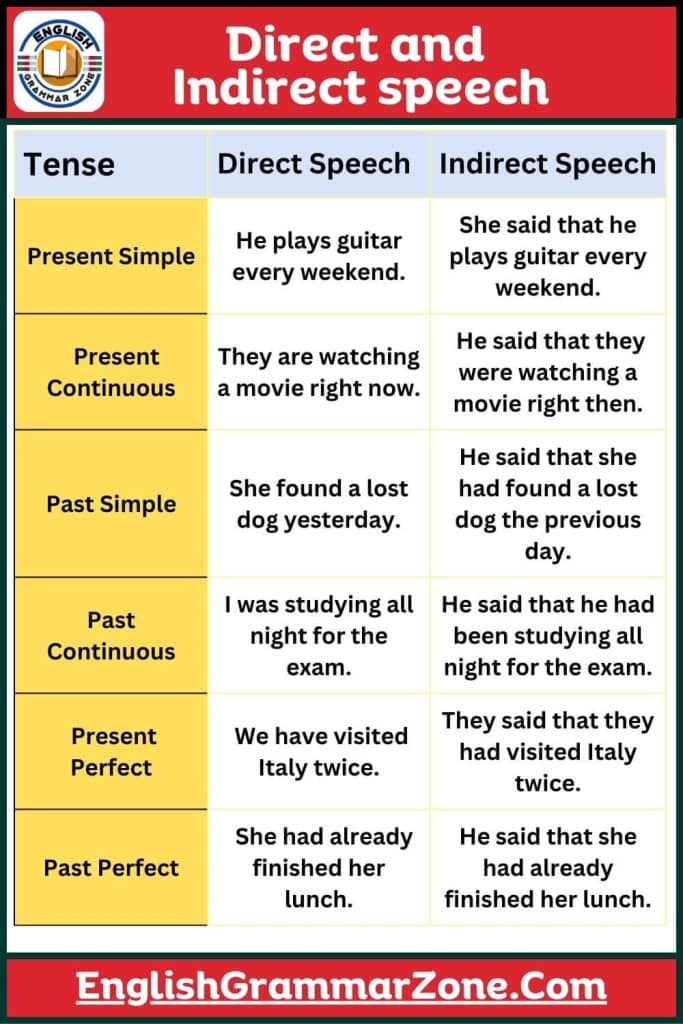Understanding how to change sentences from direct to indirect speech is an essential part of learning English. In this post, we will explore direct and indirect speech examples with tenses, helping you see how verb tenses change when reporting speech. You’ll learn easy-to-follow rules, see practical examples, and understand how to use the correct tense when converting sentences. Let’s dive in and master the reported speech with confidence.

Direct and indirect speech examples with tenses chart:
| Tense | Direct Speech | Indirect Speech |
| Present Simple | He plays guitar every weekend. | She said that he plays guitar every weekend. |
| Present Continuous | They are watching a movie right now. | He said that they were watching a movie right then. |
| Past Simple | She found a lost dog yesterday. | He said that she had found a lost dog the previous day. |
| Past Continuous | I was studying all night for the exam. | He said that he had been studying all night for the exam. |
| Present Perfect | We have visited Italy twice. | They said that they had visited Italy twice. |
| Past Perfect | She had already finished her lunch. | He said that she had already finished her lunch. |
| Will | I will meet you at the cafe tomorrow. | He said that he would meet me at the cafe the next day. |
| Would | She would like to have a cup of tea. | He said that she would like to have a cup of tea. |
| Can | They can speak Mandarin fluently. | They said that they could speak Mandarin fluently. |
| Could | He could solve difficult math problems. | He said that he could solve difficult math problems. |
| Should | You should finish your homework first. | He said that I should finish my homework first. |
| Might | She might join the dance class next month. | He said that she might join the dance class the following month. |
| Tense | Direct Speech | Indirect Speech |
| Present Simple | She likes to play tennis. | He said that she liked to play tennis. |
| Present Continuous | They are studying for the exam. | They said that they were studying for the exam. |
| Past Simple | He visited London last summer. | He said that he had visited London last summer. |
| Past Continuous | She was cooking dinner at 8 PM. | She said that she had been cooking dinner at 8 PM. |
| Present Perfect | I have finished my homework. | He said that he had finished his homework. |
| Past Perfect | She had already eaten lunch. | He said that she had already eaten lunch. |
| Will | I will call you tomorrow. | He said that he would call me tomorrow. |
| Would | She would like to go to the movies. | He said that she would like to go to the movies. |
| Can | They can speak French fluently. | They said that they could speak French fluently. |
| Could | He could swim across the lake when he was five. | He said that he could swim across the lake when he was five. |
| Should | You should apologize to him. | He said that I should apologize to him. |
| Might | She might come to the party tonight. | He said that she might come to the party tonight. |


FAQs on Direct and Indirect speech examples with Tenses
What are 10 examples of direct and indirect speech?
- Direct: He said, “I am going to the store.”
Indirect: He said that he was going to the store. - Direct: She asked, “Can you help me?”
Indirect: She asked if I could help her. - Direct: John said, “I will finish my homework later.”
Indirect: John said that he would finish his homework later. - Direct: “I have been working hard,” she said.
Indirect: She said that she had been working hard. - Direct: “I like this book,” he said.
Indirect: He said that he liked this book. - Direct: “She is coming to the party,” he said.
Indirect: He said that she was coming to the party. - Direct: “I can play the guitar,” he said.
Indirect: He said that he could play the guitar. - Direct: “I was watching TV,” she said.
Indirect: She said that she had been watching TV. - Direct: “They will arrive soon,” he said.
Indirect: He said that they would arrive soon. - Direct: “I am studying English,” she said.
Indirect: She said that she was studying English.
- Direct: He said, “I am going to the store.”
What is an example of direct and indirect speech in present continuous tense?
- Direct: “I am reading a book,” she said.
Indirect: She said that she was reading a book.
- Direct: “I am reading a book,” she said.
What is an example of direct and indirect speech past tense?
- Direct: “I watched the movie yesterday,” he said.
Indirect: He said that he had watched the movie the day before.
- Direct: “I watched the movie yesterday,” he said.
Read More

